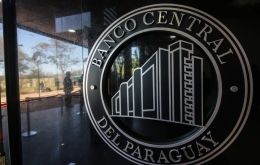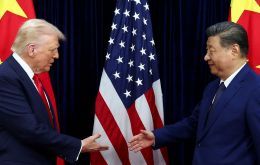MercoPress. South Atlantic News Agency
Economy
-
Wednesday, November 5th 2025 - 10:45 UTC
Brazil's Lower House passes bill to tax streaming platforms

Brazil's Lower House passed on Tuesday a bill providing for the collection of taxes on streaming services submitted by the rapporteur, Congressman Doutor Luizinho (PP-RJ). Additional wording adjustments are expected to be made on Wednesday.
-
Wednesday, November 5th 2025 - 08:08 UTC
BCP reports negative inflation for October

Paraguay's Central Bank of Paraguay (BCP) announced on Monday that the country registered a deflationary result in October 2025, the second such result this year. The monthly variation in the Consumer Price Index (CPI) was -0.1%.
-
Tuesday, November 4th 2025 - 10:16 UTC
FT says Trump teams evaluating dollarization of Argentina's economy

Sources close to US President Donald Trump said the Republican administration was actively discussing a strategy to encourage several countries to adopt the greenback as their official currency, the Financial Times (FT) reported on Sunday. The move would seek to curb China’s growing influence and maintain the dollar's global dominance.
-
Tuesday, November 4th 2025 - 08:34 UTC
Falklands, Lloyds Bank interested in operating in the Islands

The Falkland Islands Government has published a notice in the Penguin News saying that “there will be a public meeting held on Wednesday, 5th November 2025 at 5pm in the Court & Assembly Chamber.
-
Monday, November 3rd 2025 - 10:21 UTC
The Guardian highlights the hardships Argentines go through under Milei

Despite President Javier Milei's success in significantly lowering annual inflation from over 211% in 2023 to 32% by September 2025, a majority of Argentines are struggling as their purchasing power has collapsed under the administration's “chainsaw” austerity program, the London outlet The Guardian noted.
-
Saturday, November 1st 2025 - 10:28 UTC
Brazil's job creation falters interannually

According to Brazil's General Registry of Employed and Unemployed Workers (Caged) under the Labor Ministry, 213,002 formal jobs were added in September after subtracting the number of layoffs from that of hirings.
-
Friday, October 31st 2025 - 21:14 UTC
Paraguayan carrier announces new Uruguayan destination

Paraguayan company Paranair is launching a new route linking Asunción (Paraguay), Montevideo, and Rivera (Uruguay), starting on December 1. The flight originates in Asunción, makes a stopover in Montevideo, and terminates in Rivera, making it the company's fourth destination in the country.
-
Thursday, October 30th 2025 - 11:38 UTC
Fed lowers benchmark interest rate

Amid a softer labor market, the United States' Federal Reserve (Fed) voted Wednesday to cut its benchmark interest rate by 0.25 basis points, moving the target range to 3.75%–4%. This marks the lowest level in three years and continues the easing cycle dating back to last month.
-
Thursday, October 30th 2025 - 11:20 UTC
Boric promotes Chile's partnership with South Korea

Chilean President Gabriel Boric Font urged his audience during a business seminar in the South Korean city of Busan to build a partnership in the ongoing trade war with circumstantially powerful countries.
-
Thursday, October 30th 2025 - 10:55 UTC
Trump cuts down tariffs with China after meeting with Xi Jinping

US President Donald Trump announced a reduction in tariffs on Chinese goods following Wednesday's meeting in South Korea with his Chinese counterpart, Xi Jinping.
